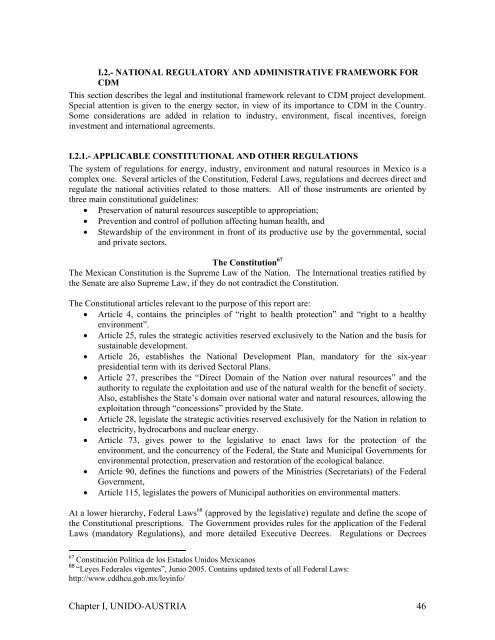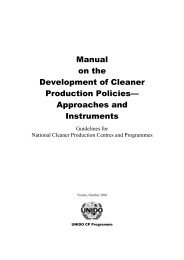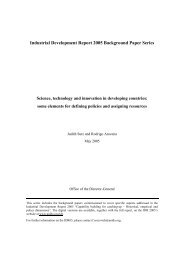mexico, support for the development and uptake of - Unido
mexico, support for the development and uptake of - Unido
mexico, support for the development and uptake of - Unido
You also want an ePaper? Increase the reach of your titles
YUMPU automatically turns print PDFs into web optimized ePapers that Google loves.
I.2.- NATIONAL REGULATORY AND ADMINISTRATIVE FRAMEWORK FOR<br />
CDM<br />
This section describes <strong>the</strong> legal <strong>and</strong> institutional framework relevant to CDM project <strong>development</strong>.<br />
Special attention is given to <strong>the</strong> energy sector, in view <strong>of</strong> its importance to CDM in <strong>the</strong> Country.<br />
Some considerations are added in relation to industry, environment, fiscal incentives, <strong>for</strong>eign<br />
investment <strong>and</strong> international agreements.<br />
I.2.1.- APPLICABLE CONSTITUTIONAL AND OTHER REGULATIONS<br />
The system <strong>of</strong> regulations <strong>for</strong> energy, industry, environment <strong>and</strong> natural resources in Mexico is a<br />
complex one. Several articles <strong>of</strong> <strong>the</strong> Constitution, Federal Laws, regulations <strong>and</strong> decrees direct <strong>and</strong><br />
regulate <strong>the</strong> national activities related to those matters. All <strong>of</strong> those instruments are oriented by<br />
three main constitutional guidelines:<br />
• Preservation <strong>of</strong> natural resources susceptible to appropriation;<br />
• Prevention <strong>and</strong> control <strong>of</strong> pollution affecting human health, <strong>and</strong><br />
• Stewardship <strong>of</strong> <strong>the</strong> environment in front <strong>of</strong> its productive use by <strong>the</strong> governmental, social<br />
<strong>and</strong> private sectors.<br />
The Constitution<br />
The Mexican Constitution is <strong>the</strong> Supreme Law <strong>of</strong> <strong>the</strong> Nation. The International treaties ratified by<br />
<strong>the</strong> Senate are also Supreme Law, if <strong>the</strong>y do not contradict <strong>the</strong> Constitution.<br />
The Constitutional articles relevant to <strong>the</strong> purpose <strong>of</strong> this report are:<br />
• Article 4, contains <strong>the</strong> principles <strong>of</strong> “right to health protection” <strong>and</strong> “right to a healthy<br />
environment”.<br />
• Article 25, rules <strong>the</strong> strategic activities reserved exclusively to <strong>the</strong> Nation <strong>and</strong> <strong>the</strong> basis <strong>for</strong><br />
sustainable <strong>development</strong>.<br />
• Article 26, establishes <strong>the</strong> National Development Plan, m<strong>and</strong>atory <strong>for</strong> <strong>the</strong> six-year<br />
presidential term with its derived Sectoral Plans.<br />
• Article 27, prescribes <strong>the</strong> “Direct Domain <strong>of</strong> <strong>the</strong> Nation over natural resources” <strong>and</strong> <strong>the</strong><br />
authority to regulate <strong>the</strong> exploitation <strong>and</strong> use <strong>of</strong> <strong>the</strong> natural wealth <strong>for</strong> <strong>the</strong> benefit <strong>of</strong> society.<br />
Also, establishes <strong>the</strong> State’s domain over national water <strong>and</strong> natural resources, allowing <strong>the</strong><br />
exploitation through “concessions” provided by <strong>the</strong> State.<br />
• Article 28, legislate <strong>the</strong> strategic activities reserved exclusively <strong>for</strong> <strong>the</strong> Nation in relation to<br />
electricity, hydrocarbons <strong>and</strong> nuclear energy.<br />
• Article 73, gives power to <strong>the</strong> legislative to enact laws <strong>for</strong> <strong>the</strong> protection <strong>of</strong> <strong>the</strong><br />
environment, <strong>and</strong> <strong>the</strong> concurrency <strong>of</strong> <strong>the</strong> Federal, <strong>the</strong> State <strong>and</strong> Municipal Governments <strong>for</strong><br />
environmental protection, preservation <strong>and</strong> restoration <strong>of</strong> <strong>the</strong> ecological balance.<br />
• Article 90, defines <strong>the</strong> functions <strong>and</strong> powers <strong>of</strong> <strong>the</strong> Ministries (Secretariats) <strong>of</strong> <strong>the</strong> Federal<br />
Government,<br />
• Article 115, legislates <strong>the</strong> powers <strong>of</strong> Municipal authorities on environmental matters.<br />
At a lower hierarchy, Federal Laws 68 (approved by <strong>the</strong> legislative) regulate <strong>and</strong> define <strong>the</strong> scope <strong>of</strong><br />
<strong>the</strong> Constitutional prescriptions. The Government provides rules <strong>for</strong> <strong>the</strong> application <strong>of</strong> <strong>the</strong> Federal<br />
Laws (m<strong>and</strong>atory Regulations), <strong>and</strong> more detailed Executive Decrees. Regulations or Decrees<br />
67<br />
67 Constitución Política de los Estados <strong>Unido</strong>s Mexicanos<br />
68<br />
“Leyes Federales vigentes”, Junio 2005. Contains updated texts <strong>of</strong> all Federal Laws:<br />
http://www.cddhcu.gob.mx/leyinfo/<br />
Chapter I, UNIDO-AUSTRIA 46
















